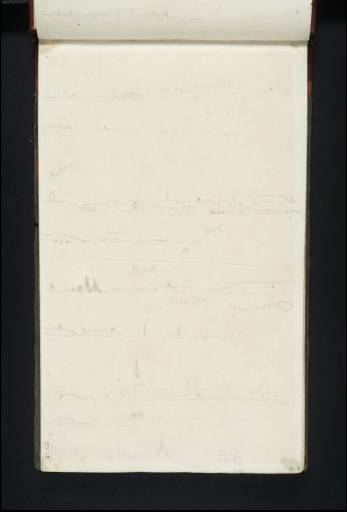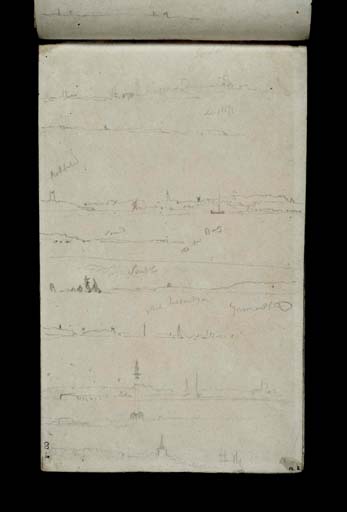Joseph Mallord William Turner Sketches of the Suffolk and Norfolk Coast: Southwold, Lowestoft, Pakefield and Great Yarmouth 1822
Image 1 of 2
Joseph Mallord William Turner,
Sketches of the Suffolk and Norfolk Coast: Southwold, Lowestoft, Pakefield and Great Yarmouth
1822
Joseph Mallord William Turner 1775–1851
Folio 2 Recto:
Sketches of the Suffolk and Norfolk Coast: Southwold, Lowestoft, Pakefield and Great Yarmouth 1822
D17510
Turner Bequest CC 2
Turner Bequest CC 2
Pencil on white wove paper, 187 x 114 mm
Inscribed in pencil by Turner, going down the page from left to right, ‘Southwold’ | ‘Lowestoft’ | ?‘Pakefield’ | ?‘sand’ | ‘[...] R[...] Bay’ | ?‘south’ | ‘White Nelson Mon’ | ‘Yarmouth Roads’
Inscribed in pencil by Finberg ‘CC 2’ bottom right
Stamped in black ‘CC 2’ bottom left descending vertically
Inscribed in pencil by Turner, going down the page from left to right, ‘Southwold’ | ‘Lowestoft’ | ?‘Pakefield’ | ?‘sand’ | ‘[...] R[...] Bay’ | ?‘south’ | ‘White Nelson Mon’ | ‘Yarmouth Roads’
Inscribed in pencil by Finberg ‘CC 2’ bottom right
Stamped in black ‘CC 2’ bottom left descending vertically
Accepted by the nation as part of the Turner Bequest 1856
Exhibition history
1857
Marlborough House, London, and other venues, 1857–8 (no.233 [NG no.438d])
References
1904
E.T. Cook and Alexander Wedderburn (eds.), Library Edition: The Works of John Ruskin: Volume XIII: Turner: The Harbours of England; Catalogues and Notes, London 1904, pp.300–1.
1909
A.J. Finberg, A Complete Inventory of the Drawings of the Turner Bequest, London 1909, vol.I, p.610, CC 2, as ‘“Southwold,” “Lowestoft,” “Yarmouth.” Exhibited Drawings, No. 438d, N.G.’.
1961
Alexander J. Finberg, The Life of J.M.W. Turner, R.A. Second Edition, Revised, with a Supplement, by Hilda F. Finberg, revised ed., Oxford 1961, p.277.
1981
Gerald Finley, Turner and George the Fourth in Edinburgh 1822, exhibition catalogue, Tate Gallery, London 1981, pp.81, [91] illustrated as ‘“Southwold”, “Lowestoft”, “Yarmouth”. Exhibited drawings, National Gallery no. 438d’.
1981
Eric Shanes, Turner’s Rivers, Harbours and Coasts, London 1981, p.152.
Views along the East Anglia coast continued from folio 1 verso (D17509) with the sketchbook turned to the right. At the top of the page, inscribed ‘Southwold’ is a sketch showing the town from the sea to the north. Rising above the town, which is indicated by a jagged line, is the tower of St Edmund’s church. At the left is the harbour indicated by a row of masts and cross-spars at the mouth of the river Blyth with Walberswick to its south. At the far left may be the tower of St Andrew’s Church, Walberswick.
About ten miles up the coast from Southwold is the town of Lowestoft, seen here in the second sketch down from the south-east. At the left is what seems to be a church tower, perhaps Pakefield Church on the cliffs to the south of the town. At the right is Lowestoft Ness, the most easterly point of the British Isles.
The third sketch, labelled ‘Pakefield’, takes us closer to the shore than the previous two sketches. The building on the cliffs to the left may be All Saints’ and St Margaret’s Church, Pakefield, and on the right a boat sails past Lowestoft, perhaps returning to the busy fishing port. Distinguishable features of the town are the Church of St Margaret’s with a windmill either side of it. At the far right of the sketch is Lowestoft Ness, which may also be the subject of the sketch beneath.
The fifth sketch down, inscribed ‘south’, may be Southwold again with St Edmund’s Church tower, but this time taken from the north. At the left of the picture are several sailing boats seen from the stern of Turner’s own vessel.
There follows four views of Great Yarmouth in Norfolk, with two more on the verso of this page (folio 2 verso; D17511). Still at some distance, the first view is from the south-east and shows the whole town from Gorleston Cliffs in the south to the North Beach. In the centre, labelled, ‘white Nelson Mon[ument]’, is the Norfolk Naval Pillar, a monument erected in 1819 in the South Denes area of town. To its left are two windmills, one of which may be the South Denes Post Mill, and to the right is the spire of St Nicholas and beyond that the masts of boats moored near by the beach.
As is evinced by the sketch at the top of folio 2 verso, there was a pier to the south of the Naval Pillar indicating that the seventh sketch on the present page shows South Denes. The coastline to the right (north) is continued in the sketch of the monument beneath. Turner studied the monument in more detail in 1824 (Tate D18212; Turner Bequest CCIX 29).
At the bottom of the page is a sketch of the northern end of Great Yarmouth with the spire (no longer extant) of the Church of St Nicholas. The town around it is indicated in shorthand by a row of box shapes and there are masts at the right.
Eric Shanes matches this page in his concordance of watercolours and sketches to a watercolour of Yarmouth Sands, circa 1830 (Fitzwilliam Museum, Cambridge).1 The viewpoint, however, differs dramatically as it is from the shore rather than the sea. The watercolour is therefore more likely to have been based on sketches in 1824.
Technical notes:
This page was detached by John Ruskin for the National Gallery Touring collection (see King’s Visit to Edinburgh sketchbook introduction) and shows signs of having been exhibited, the whole page except for a 5 mm border having yellowed from exposure to light, although the effect is more extreme on the verso. There is an area of slight damage at the bottom right where ‘CC 2’ was inscribed, probably by Finberg, before it was stamped with the same number and reattached.
This page was detached by John Ruskin for the National Gallery Touring collection (see King’s Visit to Edinburgh sketchbook introduction) and shows signs of having been exhibited, the whole page except for a 5 mm border having yellowed from exposure to light, although the effect is more extreme on the verso. There is an area of slight damage at the bottom right where ‘CC 2’ was inscribed, probably by Finberg, before it was stamped with the same number and reattached.
Thomas Ardill
September 2008
How to cite
Thomas Ardill, ‘Sketches of the Suffolk and Norfolk Coast: Southwold, Lowestoft, Pakefield and Great Yarmouth 1822 by Joseph Mallord William Turner’, catalogue entry, September 2008, in David Blayney Brown (ed.), J.M.W. Turner: Sketchbooks, Drawings and Watercolours, Tate Research Publication, December 2012, https://www


